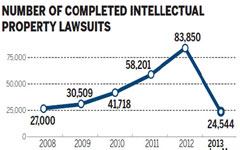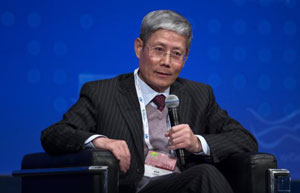Companies seek help with brand enforcement
By Cao Yin in Shenzhen, Guangdong (China Daily) Updated: 2014-04-28 07:16"Sometimes weaker evidence might lead to lower compensation. So the better approach is to ask people suspected of infringements to prove that their products are authorized by our enterprise, rather than having us supply evidence to show that the goods are fake," she said. Current law places the burden of proof on the legitimate business.
Liu Jianhong, director of the intellectual property department at Foshan Intermediate People's Court in Guangdong province, said that the compensation in recent years has been growing, and the courts are also helping enterprises recover their losses.

|
|
 |
"Some notary offices across the country have little awareness of the field of intellectual property rights, and they seldom make the effort to study," she said. That can pose barriers to building a better intellectual property protection environment.
At the same time, most small enterprises refuse to provide their financial statements and audit accounts to prove their losses to the courts, she said, "because the materials of some small companies are in a mess or are problematic".
The enterprises should also clarify and improve their financial work, "which can really help them during a trial", she said.
Xu Xuan, vice-president of the law school at Jinan University, suggested that enterprises assign personnel specifically to handle intellectual property work.
Zeng Baochun, a lawyer in Guangzhou, said that some foreign companies, such as the global luxury brand Louis Vuitton, require officers to scan the Internet every day to find out who is infringing on trademarks and other intellectual property.
"Chinese companies care more about compensation, while a global enterprise might think more about stopping the infringement," she said.
- Singapore retains top yuan offshore clearing center outside HK
- Overcapacity, slowdown bring steel industry losses
- S China footwear factory resumes production
- Brunei, China sign carbon steel pipe project
- Third party mobile payment thrives
- Alibaba takes youku stake
- Time to focus on growth quality, IMF says
- Cloud computing brings revenue to western region
















